Gordon Grice's Blog, page 61
March 24, 2012
Dog Injures Five Police Officers
Britain: Dog mauls 5 police officers, owner charged (VIDEO) | GlobalPost: "A man in the UK has been charged with possessing a dangerous dog after his animal mauled five police officers. The dog was shot dead.
Three officers are still in hospital after the "pitbull-type" animal attacked them on Thursday morning as they attempted to raid a house in Newham, east London, the Independent reported. One of them may require skin grafts."
Published on March 24, 2012 09:00
Dog Injures Five Police Oficers
Britain: Dog mauls 5 police officers, owner charged (VIDEO) | GlobalPost: "A man in the UK has been charged with possessing a dangerous dog after his animal mauled five police officers. The dog was shot dead.
Three officers are still in hospital after the "pitbull-type" animal attacked them on Thursday morning as they attempted to raid a house in Newham, east London, the Independent reported. One of them may require skin grafts."
Published on March 24, 2012 09:00
March 23, 2012
Surfer Attacks Shark, Sort Of
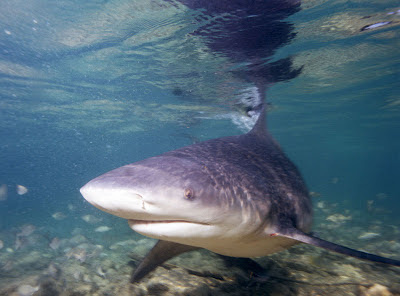 Albert Kok/Creative Commons
Albert Kok/Creative CommonsHere's a new one on me. A surfer doesn't notice the shark nearby and falls onto it, whereupon it bites him.
AFP: Australian surfer attacked by shark:
""There were two bites. One is sort of half in his calf, that's taken a big chunk out of that," fellow surfer Tim Windisch told the newspaper.
"The other one is down to his heel. It's just right down to the bone. You could see the bone.""
Published on March 23, 2012 09:00
March 22, 2012
Black Widow in the House
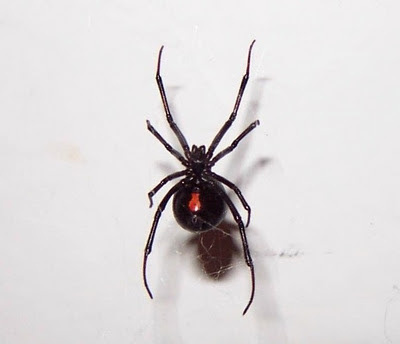
Bob Haynie sent me this photo of a black widow spider he found on the water heater in his garage. Bob is generally tolerant of spiders, even widows, in his house, but this one was too close to people for safety, so he killed it.
Published on March 22, 2012 09:00
March 21, 2012
Florida: Three Shark Attacks

It must be spring; I'm beginning to see reports of shark attacks in the US. The first two are minor bites, possibly delivered by the blacktip sharks:
Shark Attacks, Florida: Two Teenagers Attacked At New Smyrna Beach | World News | Sky News:
"New Smyrna Beach, which is on the central east coast of Florida, has previously been voted the state's best beach but it has a long history of shark attacks.
It is now known as the shark bite capital of the world after frequent attacks each year and is said to have more reports of attacks per square mile than any other beach on Earth.
Part of the same stretch of sand had to be closed in 2001 after 10 shark attacks in just 10 days.
They usually involve black tip sharks, which inflict lesser injuries. A beach patrol official has previously described them as "like a vicious dog bite"."Blacktips are generally under six feet long (though nine-footers have been recorded). They don't prey on people; attacks usually seem to happen in murky water, where a human foot might look like a fish. In hot pursuit of fish, blacktips will leap out of the water. They don't exactly check carefully before they bite. Attack records mention a lot of lacerated feet and legs, with the occasional bitten hand, buttock, or even groin.
A third shark attack occurred the next day at Florida's Canaveral National Seashore (the scene of another attack recounted in my upcoming eBook short, Shark Attacks). This time the attacker was a bull shark, a far more formidable species that occasionally kills people. In this case, though, the victim escaped with injuries to his arm.
Published on March 21, 2012 09:00
March 20, 2012
Emu Bite

Readers of The Book of Deadly Animals will recall my own adventures down on the emu farm. Nobody hurt here, but a nifty photo.
Photographer attacked by angry emu as it lunges at him | Mail Online:
"'Then it started to get closer, so I started to get closer, the next thing I knew its beak was practically on the end of my lens.'"
Thanks to Hodari Nundu for the news tip.
Published on March 20, 2012 09:00
March 19, 2012
Crocodiles vs. Fishermen in Kenya
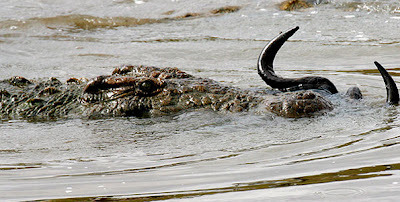
Interesting report about people, animals, and scarce resources in Kenya:
Crocodile attacks take toll on Lake Victoria's fishing communities - Corporate News |businessdailyafrica.com:
"Lillian was woken up by frantic villagers knocking on her door. Her husband's fishing crew had been attacked by a crocodile and George was missing.
"They said the crocodile was lurking in a patch of mangroves and attacked the fishermen as they were casting their net, seizing George who was at the front of the boat and dragging him away," she recalls.
George is one of the victims of a human-wildlife conflict on the shores of Lake Victoria as strategic fishing grounds diminish and residents turn to dangerous spots."
Published on March 19, 2012 09:00
March 18, 2012
Crocodiles Bite Hardest
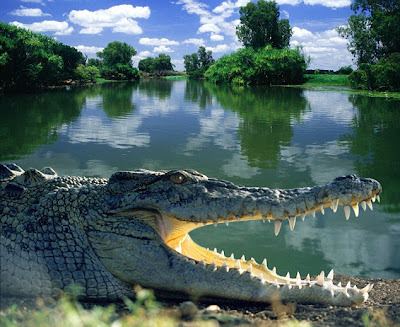
'That's not a bite, mate': Australian saltwater crocodiles have world's most ferocious jaws - snapping shut with two-ton force that makes Great Whites look toothless | Mail Online:
"Saltwater crocodiles have the strongest bite of any living animal - beating Great White sharks.
The huge reptiles, which can measure more than 20ft, have jaws that snap shut with a force of 3,700lb, or almost two tons.
In comparison, the great white shark has a chomping capacity of 2,095lb at the tip of its jaws.
The spotted hyena has the highest recorded bite force in a mammalian carnivore, at just over 1,000lb."
Published on March 18, 2012 09:00
March 17, 2012
Florida: Black Bear Bites Woman in Backside
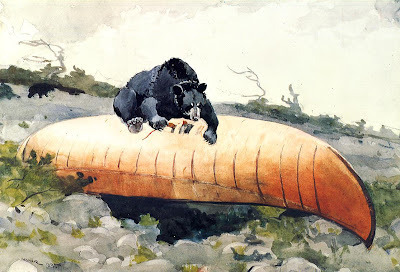
Woman carrying bag of dog feces meets mother bear near food source. The rest just writes itself.
Bear attacks woman Longwood Seminole: Woman attacked by bear in Longwood. - Orlando Sentinel:
""I could feel her breath on me. I've never been so terrified in my life," she said. "I guess by instinct I rolled over so she wouldn't hurt something vital. I didn't know what she was going to do and then the bear bit me in my butt.""
Published on March 17, 2012 09:00
March 16, 2012
Brown Recluse Spiders in the News

The brown recluse spider is making news these days after a college student named Nikki Perez suffered a serious necrotic bite. Perez was passing through the Amarillo, Texas, airport at the time. I could have told her what a bad idea that was, though my own hassles there involved a rude security guard. Perez lost part of an ear and feared for her eyesight.
The other interesting development is a study at the University of Kansas that suggest the spiders may move their range northward.
The report linked here deals with these issues and has fewer blunders than most, which isn't saying much. The bit I've excerpted quotes Rick Vetter, who likes to point out that doctors know nothing about spiders and often misdiagnose lesions. Vetter, by the way, also doubts the danger of the hobo spider, an issue I've written about on this blog before.
As mentioned in my books, I've been bitten by these spiders many times, usually when my curiosity led me into ill-considered prodding. I never suffered anything worse than a momentary flash of pain. That, or no reaction at all, is the most common outcome.
Rotting-Ear Case the Work of Deadly Brown Recluse Spider - ABC News:
""My crusade is to stop stupidity in the medical community," Vetter said.
When doctors blame a skin lesion on the brown recluse, they might overlook other more serious conditions such as methicillin-resistant staphylococcus aureus (MRSA), diabetes or even lymphoma.
In a 2005 article he co-wrote in the New England Journal of Medicine, Vetter cited 40 other conditions that can cause necrosis often misdiagnosed as a spider bite.
Vetter was so tired of doctors blaming the much-maligned spider, he started the Brown Recluse Challenge. Of 1,800 specimens sent to him, only 350 turned out to be the real deal. And all were from the Midwest.
A brown recluse bite can be life-threatening in 10 percent of the cases, but Vetter estimates there are only one or two deaths a year, typically in small children."
Published on March 16, 2012 09:00



